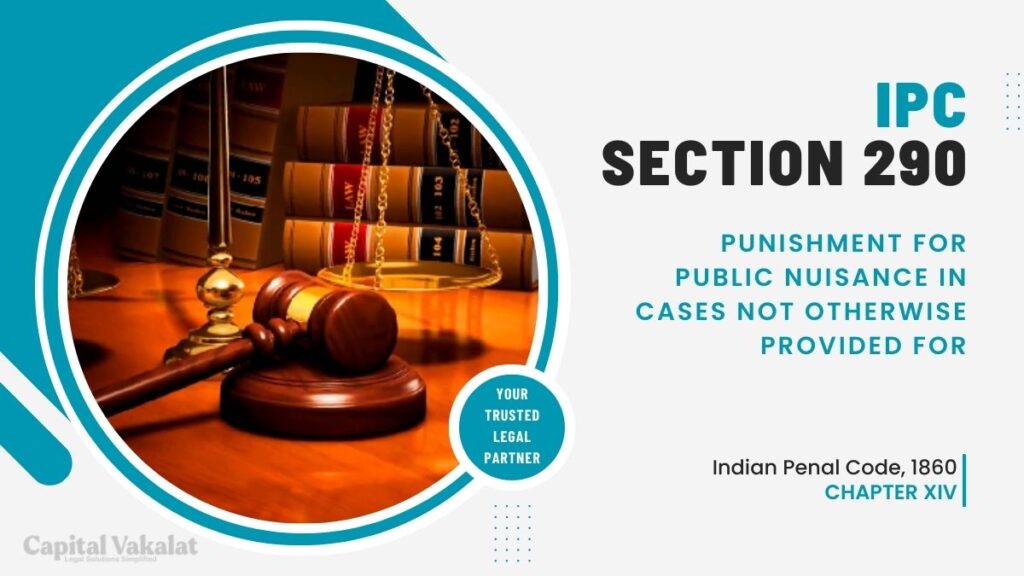In a society that values order and harmony, public nuisance can disrupt the peace and tranquility of communities, leading to a degradation in the quality of life. In India, the Indian Penal Code (IPC) has specific provisions to deal with such disturbances, one of them being Section 290 IPC.

This article explores Section 290 IPC, its implications, and the punishment for public nuisance in cases not otherwise provided for.
Introduction to Section 290 IPC
Section 290 of the IPC addresses a common problem – public nuisance. Public nuisance refers to any act or situation that causes inconvenience, damage, or harm to the public at large. It encompasses a wide range of activities, from creating loud noise in residential areas to obstructing public roads and water bodies.
Understanding Public Nuisance
Public nuisance can take many forms, including but not limited to:
- Loud and unruly gatherings
- Dumping of waste in public areas
- Encroachments on roads and footpaths
- Polluting water bodies
- Defacement of public property
- Unauthorized construction
- Offensive advertisements
- Negligence leading to accidents
Section 290 IPC: The Legal Framework
Section 290 IPC provides the legal framework for dealing with cases of public nuisance that are not specifically covered by other sections of the IPC. It states:
“Whoever commits a public nuisance in cases not otherwise provided for by this Code shall be punished with fine which may extend to two hundred rupees.”
This section empowers law enforcement authorities to take action against individuals or groups responsible for creating public nuisances. The prescribed punishment, a fine up to two hundred rupees, may seem modest, but it serves as a deterrent and emphasizes the importance of maintaining public order.
Instances of Public Nuisance
Instances of public nuisance can range from minor inconveniences to more severe disruptions. Some common examples include:
- Unauthorized political rallies causing traffic chaos
- Vendors blocking sidewalks
- Noisy parties disturbing the neighborhood
- Open defecation in public places
- Noise pollution from construction sites
Penalties and Punishments Under Section 290 IPC
Section 290 IPC specifies a fine as the punishment for public nuisance. The maximum fine is two hundred rupees. While the monetary penalty may appear insignificant, it aims to discourage individuals from engaging in activities that create public disturbances.
Factors Considered in Establishing Guilt
To establish guilt under Section 290 IPC, the following factors are typically considered:
- The nature and extent of the nuisance
- The impact on public comfort and convenience
- The intent behind the act
- The duration of the nuisance
- Any reasonable steps taken to mitigate it
These factors ensure a fair assessment of the situation before penalties are imposed.
Case Studies
To better understand the application of Section 290 IPC, let’s consider a few case studies:
- Loud Religious Procession: In a densely populated neighborhood, a religious procession with blaring music and fireworks creates a disturbance. Local authorities invoke Section 290 IPC and fine the organizers.
- Unauthorized Encroachment: Street vendors encroach upon a busy market road, obstructing pedestrian and vehicular movement. After warnings, the vendors are fined under Section 290 IPC.
Relevance in Contemporary Society
In today’s fast-paced world, public nuisance issues are becoming increasingly common. The relevance of Section 290 IPC lies in its ability to address these issues swiftly and effectively, ensuring that public spaces remain accessible and peaceful.
Preventive Measures and Responsibilities
Preventing public nuisance is a shared responsibility. Communities, individuals, and local authorities must work together to maintain a harmonious environment. Some preventive measures include:
- Public awareness campaigns
- Strict enforcement of regulations
- Timely reporting of nuisances
- Promoting responsible behavior
Conclusion
Section 290 IPC serves as a crucial tool in maintaining order and civility in society. By addressing public nuisance issues and imposing penalties, it encourages individuals and groups to be considerate of others’ comfort and convenience. It underscores the importance of maintaining a harmonious and peaceful environment for all.
Frequently Asked Questions
What is the punishment for public nuisance under Section 290 IPC?
The punishment for public nuisance under Section 290 IPC is a fine that may extend up to two hundred rupees.
Are there any other legal provisions for public nuisance in India?
Yes, besides Section 290 IPC, there are other legal provisions under various laws and local regulations that address specific forms of public nuisance.
How can individuals report public nuisance incidents?
Individuals can report public nuisance incidents to local authorities, such as the police or municipal bodies. Timely reporting is essential for effective resolution.
Can Section 290 IPC be applied to both individuals and groups causing public nuisances?
Yes, Section 290 IPC can be applied to both individuals and groups responsible for creating public nuisances. It is applicable to any party involved in such disturbances.